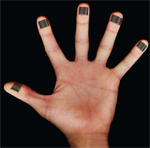
Biometrics Go Big
Technology floods the marketplace like never before
- By Megan Weadock
- Aug 01, 2010
In recent years, biometric security
systems have moved beyond the
more tradition applications -- such
as access control at businesses, government
facilities and ports -- and into
some surprising realms.
Advances in facial recognition, fingerprint
verification and other corners
of the biometric access management
field have caused prices to come down
and new installations to spread like
wildfire. Once viewed as too new or cutting-
edge by many people, the technology
is finally hitting the mainstream.
A Biometric for Everyone
Today, biometric-based access control
is making its way into a surprising
range of applications. And as the
technology becomes increasingly accessible
and affordable, even smaller
businesses are taking advantage of its
amazing capabilities.
One interesting application of biometric
technology is called the Biometric
Bouncer. The facial recognition system is
being used by upscale nightclubs -- such
as Moon, in Hamilton, Bermuda -- to
ensure guest safety and security.
When new patrons visit Moon, a
bouncer enters their information into
the Biometric Bouncer system, scans
their ID cards and takes a photo of each
of them. On their next visit, the camera
scans their facial features, matches
them to the file photo and clears them
for entry.
“If other places adopted this system,
a database could be set up to highlight
people who cause trouble,” said David
Madeiros, Moon’s manager, in a press
release. “For example, if a person gets
banned from a club down the street,
they could enter that into the system
and if they were to show up at Moon,
we would be able to see that they were
banned and what they did.”
Good Deeds, Faster
Biometrics also are having a big impact
in the healthcare industry, where security
and identity verification are always
top-of-mind.
In one interesting application, the
Oklahoma Blood Institute, a non-profit
regional blood center, is incorporating
BIO-key International’s fingerprint
identification solution to provide blood
donors a fast and convenient method to
establish their identity. The solution automates
the donor check-in process and
protects their privacy by eliminating
the need for them to produce sensitive
identification forms, such as driver’s licenses
or social security numbers.
Once a donor is entered into the system,
he or she simply touches a finger
to the scanner. The software searches
the OBI database to provide positive
ID, reducing the check-in time and lowering
the chance of human error.
“We recognize the importance of
providing convenience for our donors
and protecting their identity,” said Dr.
John Armitage, Oklahoma Blood Institute
president and CEO, in a press
release. “Using the BIO-key ID solution,
we are able to protect our donor’s
privacy while reducing the chance of
duplicate donor IDs and aliases in our
system. We are constantly looking for
ways to improve our donors’ experiences
and protect the integrity of the blood
supply for Oklahomans.”
Jim Sullivan, the sales director at
BIO-key International, said the system’s
fingerprint reader independence differentiates
it from other biometric readers.
“This enables enrollment, identification
and verification to be performed by
fingerprint scanners produced by any
of the major fingerprint reader manufacturers,”
he said. “Popular laptops,
tablet PCs, workstation keyboards and
even cell phones that have integrated
fingerprint readers can be used to establish
the donor’s ID.”
Beyond Access Control
Obviously, today’s biometric technology
isn’t just for access control applications.
Something as simple as library
book loans now can be managed using
fingerprint recognition systems, as
prices continue to drop and functionality
improves.
In June, the U.K. Telegraph reported
that students in Manchester, England,
would have the option to scan their
thumbprints in order to check out a
library book. School officials said the
voluntary system is heavily encrypted,
so that no images of fingerprints are
stored. Instead, their thumbprints are
digitally transformed into electronic
codes, which are later compared against
each child’s thumbprint scan. Eventually,
the program will include children
ages 4 to 11.
Not surprisingly, privacy advocates
and some students’ parents immediately
cried foul.
“For such a trivial issue as taking
out of library books, the taking of
fingerprints is way over the top and
wrong,” one critic said. “It conditions
children to hand over sensitive personal
information.”
In addition to privacy concerns,
some biometric applications raise
unprecedented security issues. For
example, this year Hitachi’s “finger
vein” technology was installed on a
bank ATM in Poland. Although the
scanners have been used for years in
Japan, this was their first appearance
in Europe.
The technology does away with the
need for ATM cards and helps prevent
scams like skimming. But how will the
criminal element adapt to this new development?
It’s disturbing to imagine
the grisly ways in which user’s biometric
identifiers could be hijacked.
Here’s hoping that organizations using
these interesting new applications
will be mindful of the possibilities and
employ multi-factor authentication
wherever possible.